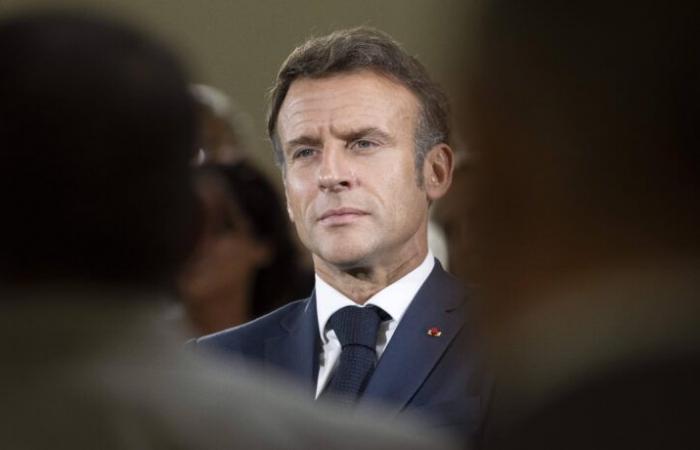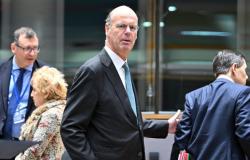
Statements that arouse the ire of several African leaders. During his speech at the Conference of Ambassadors this Monday, Emmanuel Macron returned to France’s foreign policy in Africa, marked in recent months by the withdrawal of its military forces in Burkina Faso, Niger, Mali or more recently in Chad. “We left because there were coups d’état, because we were there at the request of sovereign states who had asked France to come,” invoked the French head of state.
“I think we forgot to say thank you,” he added a little later in his speech, on the subject of the fight against terrorism led by the French army in the Sahel, in particular via the Serval operations. (2013-2014) and Barkhane (2014-2022). “Ingratitude, I am well placed to know, is a disease that is not transmissible to humans. I say this for all the African leaders who did not have the courage vis-à-vis their public opinion to support it, none of them would be with a sovereign country today if the French army did not was not deployed in this region. »
Emmanuel Macron also suggested in his speech that the departure of French soldiers based in several countries on the continent had been negotiated with certain leaders. “We proposed to African heads of state to reorganize our presence. […] I can tell you that in some of these countries, we did not want to remove the French army or even reorganize it, but we took it on together. That’s what partnership is all about,” he explained.
After this outing, Senegalese Prime Minister Ousmane Sonko reacted on Monday on the social network “No discussion or negotiation has taken place to date and the decision taken by Senegal stems from its sole will, as a free, independent and sovereign country,” assured the official. The Chadian President, Mahamat Idriss Déby, for his part judged this Tuesday that Emmanuel Macron “is in the wrong era” by adopting such a position.
Does this new episode mark a new stage in the deterioration of relations between France and several African states? Decryption with Nicolas Normand, former French ambassador to Mali (2002-2006), Congo (2006-2009) and Senegal (2010-2013), and author of the “Great Book of Africa” (ed. Eyrolles).
During the Conference of Ambassadors, Emmanuel Macron declared that “France is not in decline in Africa, it is simply lucid, it is reorganizing itself. […] We chose to move to Africa […] because we had to move. » Do you share this observation?
The problem with this intervention is that it was extremely clumsy, at least with regard to the populations of the African states concerned. If we mentioned the problem of ingratitude, we had to compare the help that African countries had given us with the Senegalese riflemen, as François Hollande did when he came to the Mali in 2013.
We cannot just appear as the savior, that comes across as extremely arrogant towards African countries, especially as a former great colonial power. As for the fact that President Macron said that without French military intervention, certain African countries would no longer be sovereign states, this is only a hypothesis that can be discussed. We cannot be affirmative on this subject; saying it that way is a bit excessive.
On the withdrawal of French troops, Emmanuel Macron also declared that it had been negotiated and that the primacy of stating it had been left to the States concerned. To my knowledge, this is only true in one case: that of Ivory Coast. As for Chad and Senegal, there were discussions with Jean-Marie Bockel (the personal envoy of the President of the Republic for Africa, editor’s note). It was planned to reduce French military personnel, but we were clearly overtaken. Not to mention the central Sahel (Mali, Niger, Burkina Faso), where we were expelled without notice.
The French president also said that African leaders had “forgotten to say thank you” to France for its fight against terrorism in the Sahel and the region. Comments then denounced by Senegal and Chad. Does this exchange of arms symbolize a new stage in the deterioration of France’s relationship with the various African states?
You have to look at this on a case by case basis. In Chad, the reaction is a bit surprising, because President Déby and his father owe almost their existence as heads of state to France. We saved them from the rebels several times, while the current president was somehow enthroned by Emmanuel Macron. It is simply out of opportunism that the current leader wants to ride on public opinion, which is still quite anti-French. It is also possible that President Déby reacts in this way in retaliation in reaction to the preliminary investigation opened by the courts in France against him for suspicion of ill-gotten gains.
In Senegal, on the other hand, we are well aware of the populist support of Ousmane Sonko and President Faye. That being said, it is true that Emmanuel Macron’s comments did not apply to this country, because there was no contact with Mr. Bockel, who was unable to go to Senegal. There has therefore been no discussion or negotiation on reducing the French military footprint within its borders. Ousmane Sonko took it badly and therefore added fuel to the fire…
In his protest message, Ousmane Sonko recalled the importance of the mobilization of African soldiers during the Second World War. Do we still need to work on this memorial aspect, linked to French colonization in Africa, to initiate new relationships?
This is important, because there is a virtual absence of this work on issues related to colonization. The case of the Thiaroye massacre (several dozen Senegalese riflemen killed by French colonial forces in 1944, editor’s note) is emblematic. It was not until the end of 2024 that French Foreign Minister Jean-Noël Barrot recognized that it was indeed a massacre. Better late than never, but it’s a shame to have waited so long to recognize a serious fault on the part of the French army.
-President Macron has, however, made a certain effort on questions of memory. It allowed the repatriation, although marginal, of certain art objects to African countries. He made an effort at reconciliation with Algeria, without much success, but also with Rwanda, for which it worked better.
With the withdrawal of French military troops from the Sahel, is Paris able to reinvent its diplomacy in Africa? The President of the Republic notably called for “ look at “Africa” as a continent of opportunities…
Nicolas Sarkozy, François Hollande and Emmanuel Macron have each denounced what is called Françafrique. But they did not fully understand that the perception of this concept was not the same in Africa as from the point of view of French leaders. For the latter, this term referred to the establishment of hidden financing and networks. But for Africans, this meant a kind of neocolonialism, an imperialist tutelage that does not want to die.
For them, this meant, for example, the presence of French military bases, the CFA franc, driving or moral lessons that we did not fail to do regularly, development aid considered intrusive… African countries had the impression that there was a kind of tutelary African policy, ineffective and restrictive, which they accused, rightly or wrongly, of being responsible for their development problems. To this must be added the French military operations Serval and Barkhane, which did not have the expected results, since the security situation has worsened in the region.
A diagnosis should have been made. However, the last three French presidents have not done so. They did not understand that there were structural problems in French-speaking Africa, which are linked to the weakness of States, with poorly competent armies, public services that function poorly, a poorly controlled territory, a system of disastrous education… It was necessary to address these fundamental problems, which are at the origin of jihadism and insecurity. This is also linked to demographics: there is a very large number of rising youth who have no job opportunities, who are radicalizing and rebelling against their authorities and then against their main partner, France.
Emmanuel Macron visited Morocco at the beginning of autumn. He signed investment agreements worth 10 billion euros with the country. A partnership of “unprecedented ambition”, he welcomed on Monday. Is renewing this type of operation with other countries a good strategy?
I don’t think so. Emmanuel Macron first made a laudable effort to want to get closer to Algeria. She did not respond favorably. So, he went to the opposite extreme, which consists of recognizing the Moroccanness of Western Sahara, therefore making major concessions to Morocco and adopting the position contrary to that usually taken by the Quai d’Orsay, with a balance between Rabat and Algiers. It’s good to have a good relationship with Morocco, but if it comes at the cost of a very significant quarrel with Algeria, it’s still unfortunate.
There is a constant desire, which does not date from Macron, to develop our relations with English-speaking Africa. This is commendable, since currently we only have 1% of our foreign trade with this region. […] But the problem with this strategy is that it must not be done to the detriment of understanding what is happening with French-speaking Africa. But it happened like that! At the Quai d’Orsay, we have often appointed directors of policy in Africa, specialists in the English-speaking part of the continent. Result: we left the French-speaking part to rot.
We cannot neglect what is happening in the Sahel as we have done. When there was the Mali crisis in 2012, I was ambassador to Senegal. I realized that at that time no one in Paris understood what was happening in Mali. There was a lack of knowledge and skills as a result of neglecting French-speaking Africa for years.
China, Russia, Iran… Great powers are gradually extending their influence in Africa. Can France – and must it – offer an alternative to this interference on the continent?
Yes, but to take the example of Russia, we cannot prevent it from doing what it wants to do. First, because we are not on the same ground: Moscow produces propaganda based on lies and inventions. They claim that French soldiers would extract gold from the Sahel and send it to their country. Or that the soldiers of Operation Barkhane were in reality helping the jihadists instead of fighting them… France cannot engage in a field of lies and inventions like this.
However, the African reader or listener cannot know who is right between the truth and the lie. So, he tends to believe what is closest to his intuitions – that is to say, often, that the former colonial power continues to plunder, exploit, dominate… The foundation of Russian propaganda is based on this idea of France. But it is quite anchored in the popular imagination in Africa, so the Russians are exploiting it on this favorable ground. […] The idea that the stability of the Sahel is favorable to France and Europe does not seem obvious to them.





